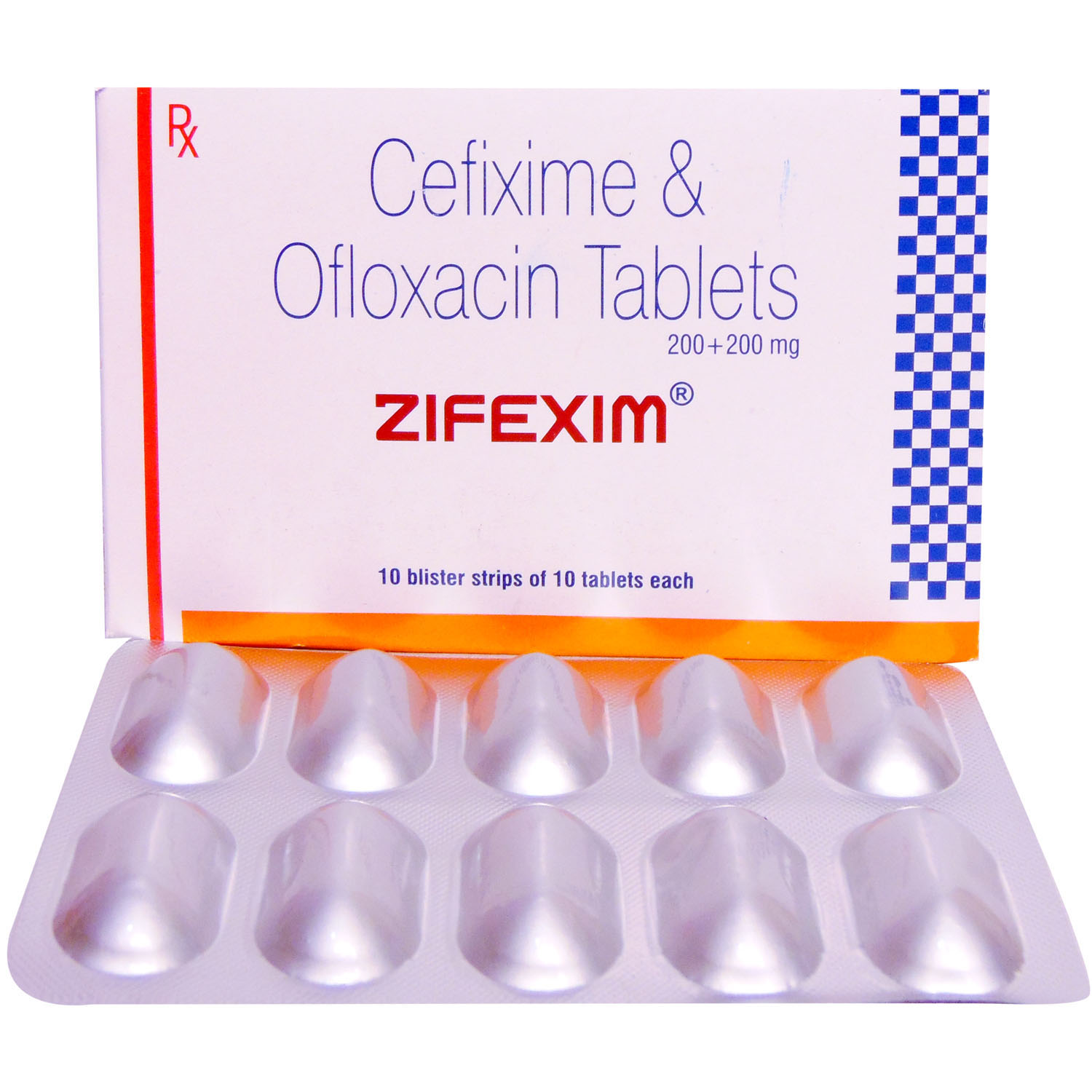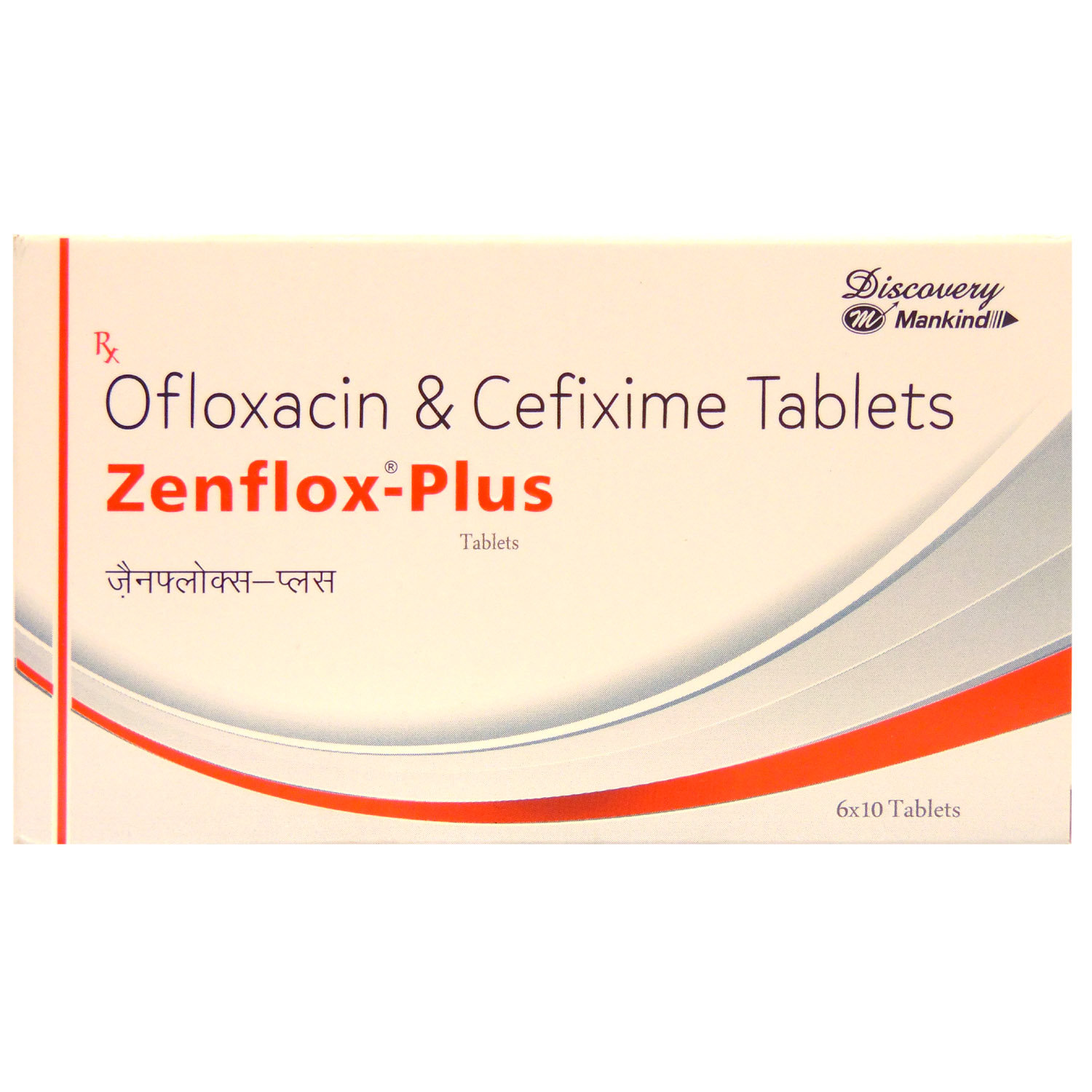Besixime-O Tablet

MRP ₹158.25
(Inclusive of all Taxes)
₹23.7 Cashback (15%)
Besixime-O Tablet is used for the treatment of a wide range of bacterial infections of the skin, ears, lungs, prostate and urinary tract. Besides this, it also treats typhoid fever and STDs (sexually transmitted diseases) like chlamydia and gonorrhoea. It contains Cefixime and Ofloxacin, which works by preventing the formation of the outer covering of the bacteria (cell wall) required for their survival. It prevents the release of a chemical messenger (mucopeptides) by the bacteria, thereby weakening and destroying the bacterial cell wall. It may cause some common side effects such as diarrhoea, indigestion, nausea, loose stools, abdominal pain, and vomiting.
Know Your Delivery Time
Provide Delivery Location

Secure Payment

India's Most Trusted Pharmacy

Genuine Products
Composition :
Consume Type :
Return Policy :
Expires on or after :
About Besixime-O Tablet
Besixime-O Tablet belongs to a group of medications called 'cephalosporin antibiotics' primarily used for the treatment of a wide range of bacterial infections of the skin, ears, lungs, prostate and urinary tract. Besides this, it also treats typhoid fever and STDs (sexually transmitted diseases) like chlamydia and gonorrhoea.
Besixime-O Tablet contains 'Cefixime' (cephalosporin antibiotic) and 'Ofloxacin' (fluoroquinolone antibiotic) that work by preventing the formation of the outer covering of the bacteria (cell wall) required for their survival. Besixime-O Tablet prevents the release of a chemical messenger (mucopeptides) by the bacteria, thereby weakening and destroying the bacterial cell wall.
Take Besixime-O Tablet as prescribed. Your doctor will recommend how often you take Besixime-O Tablet based on your medical condition. Besixime-O Tablet may cause some common side effects that include diarrhoea, indigestion, nausea, vomiting, loose stools, and abdominal pain. However, some of these side effects do not require medical attention and will pass within a couple of days. If side effects persist or worsen, please consult their doctor.
Besixime-O Tablet is not allowed to be used in patients who are already taking any other antibiotics or have kidney or liver problems. It is usually not recommended for pregnant or breastfeeding women. People with diabetes should contact a doctor before taking Besixime-O Tablet as Besixime-O Tablet can lower your blood sugar level in some cases.
Ofloxacin present in Besixime-O Tablet may cause and aggravate symptoms of existing peripheral neuropathy (nerve damage in legs), tendinitis (swelling or tearing of a tendon), myasthenia gravis (skeletal muscle weakness), and respiratory issues like bronchitis, sinusitis. Patients with central nervous system disorders or epilepsy (fits) should avoid intake of Besixime-O Tablet as its use is contraindicated for them.
Uses of Besixime-O Tablet
Besixime-O Tablet is used to treat a wide range of bacterial infections. The detailed uses of Besixime-O Tablet are as follows:
- Soft tissue infections: Besixime-O Tablet treats bacterial infections of the skin and infected tissues.
- Intra-abdominal infections: Besixime-O Tablet treats bacterial infections within the abdominal cavity.
- Respiratory tract infections: Besixime-O Tablet treats infections of the sinuses, lungs, throat, and middle ear.
- Urinary tract infections: Besixime-O Tablet provides effective treatment for bacterial infections of the urinary system.
- Typhoid fever: Besixime-O Tablet treats systemic infection caused by Salmonella typhi.
- Nosocomial infections: Besixime-O Tablet prevents hospital-acquired infections caused by resistant bacteria.
- Sexually transmitted infections (STIs): Besixime-O Tablet is used in the treatment of specific bacterial STIs by targeting the causative organisms.

Have a query?
Directions for Use
- Take Besixime-O Tablet with or without food, or as advised by your doctor.
- Follow your doctor's instructions regarding the dosage and duration for effective results.
- Swallow it as a whole with water.
- Do not crush or chew it.
Medicinal Benefits
- Helps treat a wide range of bacterial infections affecting the respiratory tract, urinary tract, skin, and soft tissues.
- Effective against typhoid fever and other gastrointestinal infections caused by susceptible bacteria.
- Used to manage ear, nose, and throat infections like sinusitis, tonsillitis, and otitis media.
- Provides relief from bronchitis and pneumonia by eliminating infection-causing bacteria.
- Treats urinary tract infections (UTIs), including cystitis and pyelonephritis.
- Helps manage gynecological infections and certain sexually transmitted bacterial infections.
- Offers broad-spectrum antibacterial activity, effective against both Gram-positive and Gram-negative bacteria.
How Besixime-O Tablet Works
Storage
What if I have taken an overdose of Besixime-O Tablet
Drug Warnings
- You should avoid taking Besixime-O Tablet if you are hypersensitive to ofloxacin, cefixime or other macrolide antibiotics as it may lead to overdose and toxicity.
- Besixime-O Tablet is usually not recommended for pregnant or breastfeeding women.
- Ofloxacin present in Besixime-O Tablet may cause and aggravate symptoms of existing peripheral neuropathy (nerve damage in legs), tendinitis (swelling or tearing of a tendon), myasthenia gravis (skeletal muscle weakness), and respiratory issues like bronchitis, sinusitis.
- People with diabetes should contact a doctor before taking Besixime-O Tablet as Besixime-O Tablet can lower your blood sugar level in some cases.
- Patient with central nervous system disorder or epilepsy (fits) should avoid intake of Besixime-O Tablet as its use is contraindicated for them.
Drug-Drug Interactions
Drug-Drug Interactions
Login/Sign Up
Coadministration of Besixime-O Tablet with Cisapride can increase the risk or severity of irregular heart rhythms.
How to manage the interaction:
Taking Besixime-O Tablet with Cisapride together can result in an interaction, it can be taken if your doctor has advised it. However, if you experience sudden dizziness, lightheadedness, fainting, shortness of breath, chest pain or tightness, rapid heartbeat, or memory loss, contact a doctor immediately. Do not discontinue any medications without consulting a doctor. Note: Cisapride is no longer available on the market. Cisapride should only be taken if prescribed by a doctor and closely monitored.
Coadministration of Besixime-O Tablet with Dronedarone can increase the risk or severity of irregular heart rhythm.
How to manage the interaction:
Taking Besixime-O Tablet with Dronedarone together can result in an interaction, it can be taken if your doctor has advised it. However, if you experience sudden dizziness, lightheadedness, fainting, shortness of breath, chest pain or tightness, rapid heartbeat, or memory loss, contact a doctor immediately. Do not discontinue any medications without consulting a doctor.
Coadministration of Besixime-O Tablet with Sotalol can increase the risk or severity of irregular heart rhythms.
How to manage the interaction:
Taking Besixime-O Tablet with Sotalol together is generally avoided as it can result in an interaction, it can be taken if a doctor has advised it. If you experience sudden dizziness, lightheadedness, fainting, shortness of breath, chest pain or tightness, rapid heartbeat, or memory loss, contact a doctor. Do not discontinue any medications without consulting a doctor.
Using bepridil together with Besixime-O Tablet drugs can increase the risk of an irregular heart rhythm that may be serious.
How to manage the interaction:
Taking Besixime-O Tablet with Bepridil can cause an interaction, please consult your doctor before taking it. You should seek immediate medical attention if you develop sudden dizziness, lightheadedness, fainting, or fast or pounding heartbeats. Do not stop using any medications without consulting a doctor.
The combination of Amiodarone and Besixime-O Tablet may significantly increase the risk of an abnormal heart rhythm.
How to manage the interaction:
Although Amiodarone and Besixime-O Tablet interact, it can be taken if prescribed by a doctor. If you get dizziness, lightheadedness, fainting, or fast or racing heartbeats, consult a doctor. Do not stop taking any medications without consulting a doctor.
Using Mesoridazine together with Besixime-O Tablet can increase the risk of an irregular heart rhythm that may be serious.
How to manage the interaction:
Taking Mesoridazine with Besixime-O Tablet is not recommended, please consult your doctor before taking it. You should seek immediate medical attention if you develop sudden dizziness, lightheadedness, fainting, shortness of breath, or heart palpitations. Do not stop using any medications without talking to a doctor.
Coadministration of Besixime-O Tablet with Ziprasidone can increase the risk or severity of irregular heart rhythm.
How to manage the interaction:
Taking Besixime-O Tablet with Ziprasidone together can result in an interaction, it can be taken if your doctor has advised it. However, if you experience sudden dizziness, lightheadedness, fainting, shortness of breath, chest pain or tightness, rapid heartbeat, or memory loss, contact a doctor immediately. Do not discontinue any medications without consulting a doctor.
Coadministration of Besixime-O Tablet with Saquinavir can increase the risk or severity of irregular heart rhythms.
How to manage the interaction:
Taking Besixime-O Tablet with Saquinavir together is generally avoided as it can result in an interaction, it can be taken if your doctor has advised it. However, if you experience sudden dizziness, lightheadedness, fainting, shortness of breath, chest pain or tightness, rapid heartbeat, or memory loss, contact a doctor immediately. Do not discontinue any medications without consulting a doctor.
Coadministration of Besixime-O Tablet with Disopyramide can increase the risk of irregular heart rhythms.
How to manage the interaction:
Taking Besixime-O Tablet with Disopyramide together is not recommended as it can result in an interaction, it can be taken if your doctor has advised it. However, if you experience sudden dizziness, lightheadedness, fainting, shortness of breath, or rapid heartbeat, contact a doctor immediately. Do not discontinue any medications without consulting a doctor.
Coadministration of Besixime-O Tablet with Pimozide can increase the risk or severity of irregular heart rhythms.
How to manage the interaction:
Taking Besixime-O Tablet with Pimozide together can result in an interaction, it can be taken if your doctor has advised it. However, if you experience sudden dizziness, lightheadedness, fainting, shortness of breath, chest pain or tightness, rapid heartbeat, or memory loss, contact a doctor immediately. Do not discontinue any medications without consulting a doctor.
Drug-Food Interactions
Drug-Food Interactions
Login/Sign Up
Diet & Lifestyle Advise
- Include probiotics in your diet as probiotics contain healthy bacteria that are good for the intestines and can recover the killed bacteria.
- Taking probiotics after completing the antibiotics course can minimize the chances of antibiotic-associated diarrhoea. Foods that are high in probiotics include yoghurt, cheese, sauerkraut, and kimchi so consume them to restore the good bacteria of the intestine.
- Try to take more fibre-enriched food as it will help the food to digest properly and helps to stimulate the growth of gut bacteria.
- Include whole grains like whole-grain bread, brown rice to include fibre in your diet.
- Try to consume less calcium, iron-enriched foods, and drinks as it may slow down the working of Besixime-O Tablet.
- Try to limit the consumption of alcoholic beverages as it can cause worsening of side effects and make your body dehydrated and affect your sleep. This also makes it difficult for your body to aid the Besixime-O Tablet in fighting off infections.
Habit Forming
Therapeutic Class
All Substitutes & Brand Comparisons
RX
ZIFEXIM TABLET
₹102.5
(₹9.23 per unit)
35% CHEAPERRX
Hifen Plus 200 mg Tablet 10's
Hetero Drugs Ltd
₹125.5
(₹11.3 per unit)
20% CHEAPERRX
Zenflox-Plus Tablet 10's
Mankind Pharma Pvt Ltd
₹168.5
(₹15.17 per unit)
6% COSTLIER
Alcohol
Unsafe
Avoid consumption of alcohol as it may worsen the side effects of Besixime-O Tablet.
Pregnancy
Unsafe
If you are pregnant or planning pregnancy, avoid taking Besixime-O Tablet. If you become pregnant while on treatment with Besixime-O Tablet, stop taking it and contact your doctor immediately.
Breast Feeding
Unsafe
If you are a breastfeeding mother, avoid taking Besixime-O Tablet.
Driving
Unsafe
Besixime-O Tablet may cause sleepiness, dizziness or may affect your eyesight. Therefore, avoid driving if you are not alert after taking Besixime-O Tablet.
Liver
Caution
Besixime-O Tablet should be taken with caution in patients having a history of liver diseases/conditions. The doctor may suggest lower doses initially.
Kidney
Caution
Besixime-O Tablet to be taken with caution, especially in persons having a history of Kidney disorders. The doctor may initially suggest a lower dose of initially.
Children
Unsafe
Besixime-O Tablet is not recommended for children below 18 years of age.
Heart
Unsafe
Besixime-O Tablet is not recommended for use in heart patients as it can lead to cardiovascular effects.
Geriatrics
Unsafe
Besixime-O Tablet is not recommended for use in elderly patients as it can lead to side effects.
FAQs
Besixime-O Tablet is used for the treatment of a wide range of bacterial infections of the skin, ears, lungs, prostate and urinary tract. Besides this, it also treats typhoid fever and STDs (sexually transmitted diseases) like chlamydia and gonorrhoea.
No, you should not double the dose if you forget to take Besixime-O Tablet, then take it as soon as you remember or skip it if it is time for the next dose.
Yes, some patients may experience diarrhoea, after taking this medicine so it is better to take this drug after a meal which reduces the risk of stomach discomfort. However, If you are noticing diarrhoea that is watery or bloody, then immediately ask your doctor. Do not try to take self-medication for diarrhoea without asking the doctor.
Yes, this medicine is prescribed for the treatment of urinary tract infection (UTI). Take Besixime-O Tablet only if the doctor has prescribed you this medicine.
You should avoid driving as this medicine may cause impaired vision or affect the thinking ability so avoid such a task that needs a clear vision.
You should avoid taking Besixime-O Tablet if you have peripheral neuropathy (nerve damage in legs), tendinitis (swelling or tearing of a tendon), myasthenia gravis (skeletal muscle weakness), respiratory issues like bronchitis, sinusitis, diabetes, central nervous system disorder, or epilepsy (fits).
No, Besixime-O Tablet is not advised for viral infections, such as the common cold. It is a strong antibiotic used to treat severe bacterial infections.
You are advised to take Besixime-O Tablet as recommended by your doctor. Complete the full treatment as prescribed to show its effectiveness, as discontinuing suddenly may cause antibiotic resistance.
No, Besixime-O Tablet is not recommended for viral infections. Besixime-O Tablet is an antibiotic used to treat bacterial infections. Do not self-medicate.
Besixime-O Tablet doesn’t respond against the viral infections such as cough. Therefore, if you have cough, consult your doctor for appropriate medication.
Yes, cefix contains cefixime as its active substance and is an antibiotic used to treat bacterial infections of urinary tract, lungs, throat, airways, tonsils, middle ear, and cervical or urethral regions.
Take Besixime-O Tablet as recommended by your doctor. Taking Besixime-O Tablet with milk may potentially affect its effectiveness.
No, do not take Besixime-O Tablet for stomach infections as it could be due to various reasons. Also, avoid taking Besixime-O Tablet for any infection without doctor’s advice.
Yes, Besixime-O Tablet is a strong antibiotic that can treat various bacterial infections. Do not self-medicate.
Besixime-O Tablet can be used for sinus infections (sinusitis) if caused by bacteria and if it is advised by a doctor. However, please consult a doctor as it varies for everyone based on your health condition.
No, do not take Besixime-O Tablet on your own as inappropriate usage of antibiotics may cause failure of the treatment in future.
The dosage of Besixime-O Tablet treatment vary based on the specific condition and patient response to the medication. If you do not notice any improvement within 3-4 days of starting the treatment, please consult your doctor. Do not self-medicate.
Besixime-O Tablet contains Cefixime (cephalosporin antibiotic) and Ofloxacin (fluoroquinolone antibiotic) as its active substances.
Consult your doctor if you don’t get better after using Besixime-O Tablet. Also, inform about the unwanted effects and the symptoms that worsen while using Besixime-O Tablet.
UTIs are usually treated with antibiotics. To prevent UTIs, it's important to stay hydrated, urinate after sex, avoid irritating female hygiene products, and wear cotton underwear. For frequent UTIs, doctors may recommend low-dose antibiotics or other preventive options, including probiotics.
Store Besixime-O Tablet at room temperature. Protect from light. Keep it out of reach from children. Disposal of Besixime-O Tablet is done by following the local guidelines.
Country of origin
Disclaimer
Author Details
We provide you with authentic, trustworthy and relevant information
Reference
- https://www.zuventus.co.in/sites/default/files/2024-12/C%20Tax-OF%20PIL.pdf
- https://www.mespahealthcare.com/prescription/MAGNICEF-O.PDF
- https://www.accessdata.fda.gov/drugsatfda_docs/label/2017/202091s005,203195s006lbl.pdf
- https://www.drugs.com/drug-interactions/cefixime.html
- https://www.ciplamed.com/content/omnix-o-tablets








